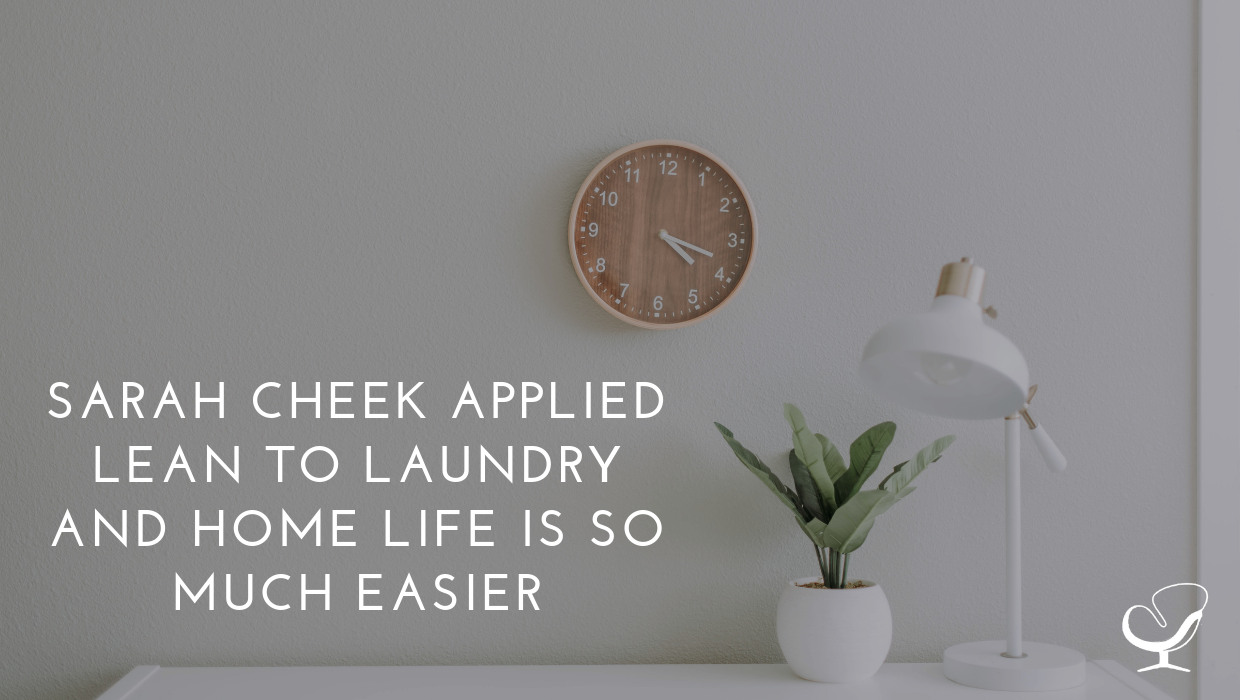Podcast: Play in new window | Download | Embed
Have you ever heard of LEAN and wondered how you can implement it into your life? Are you looking for processes to make your daily life more streamline? Need a helping hand or the push in the right direction to get started?
In this podcast episode, Joe Sanok speaks with Sarah Cheek about how she applies the LEAN principles to her laundry and home life.
Podcast Sponsor
 TherapyNotes facilitates the workflow of mental health professionals through robust, secure, and streamlined software, accessible wherever and whenever you need it. With fully-integrated scheduling, notes, billing, electronic claims, and more, you’ll have more time for what matters most: your patients.
TherapyNotes facilitates the workflow of mental health professionals through robust, secure, and streamlined software, accessible wherever and whenever you need it. With fully-integrated scheduling, notes, billing, electronic claims, and more, you’ll have more time for what matters most: your patients.
To get 2 free months of TherapyNotes click on www.therapynotes.com and enter the promo code: Joe18
Meet Sarah Cheek
 Sarah Cheek is a certified Lean Leader and founder of Lean Into Living. Since 2009, she has led multiple organizations in full scale adoptions of Lean Management. Sarah has facilitated hundreds of people in Kaizen (aka rapid improvement) workshops, and she has trained all levels of staff ranging from executives to front line employees in Lean Management.
Sarah Cheek is a certified Lean Leader and founder of Lean Into Living. Since 2009, she has led multiple organizations in full scale adoptions of Lean Management. Sarah has facilitated hundreds of people in Kaizen (aka rapid improvement) workshops, and she has trained all levels of staff ranging from executives to front line employees in Lean Management.
Sarah started applying the Lean tools that she’d been studying and implementing, over the prior 7 years, to her home life. Her perspectives and attitudes shifted to ease and relief in each of the areas as she applied the Lean principles. Sarah found she had more time and less stress. She created systems to support living better. Her first achievement was that she gained back 2 hours a week by just improving her laundry process; no added resources or money spent.
Sarah’s desire is to share these adapted tools with the world and give people their time back to engage and live more deliberately. Lean Into Living provides the tools to raise consciousness in every home by bringing more ease and grace to living.
Find out more about Sarah on Facebook and Instagram.
Sarah Cheek’s Story
Sarah was born with a desire to help and serve. She naturally found herself drawn towards a career in healthcare. After earning her degree in nursing, she jumped into the deep end in the Intensive Care Unit at UCLA Medical Center. What better environment to serve humanity than when patients and families are in their most powerless and vulnerable state? Sarah was honored to be in their service.
During her first year in the Bay Area, Sarah was fortunate enough to be selected to participate in the inaugural Lean activity at her hospital. The hospital where she worked had hired a consulting firm to help implement Lean Management across the organization. Sarah immediately witnessed and experienced the value of this management method. Lean gave the front line staff (the true experts) a voice to advocate for improvements to better serve the patients. She was hooked. After that first Lean workshop, Sarah served as a Lean Champion in her department and then advanced to be one of the first internal Lean Consultants to support the organization in continued growth. She has taken the principles and tools and applied them across many health care venues from clinics to surgery centers to hospitals.
In This Podcast
Summary
In this episode Joe speaks with Sarah Cheek about how she adjusted and implemented the LEAN principles to her household and into her daily routine. She shares some tips on how you too can apply these principles so that you can learn to spend your time more efficiently.
Principles Of LEAN
The 2 founding principles of LEAN are to remove and eliminate waste and respect for people.
- Eliminating waste – what are the barriers that are preventing you from moving forward in your experience or or your process.
- Respect for people – systems are not setting people up for success.
Types Of Waste
- Touch – handling something more than it needs to be touched. Based on what type of waste your inefficiencies fall under, will determine what you do to create the fix for the problem (a bill by mail gets touched at least 5 times before it is dealt with and filed/paid/tossed).
- Damn It – an error that causes a break in finishing the task, resulting in major frustration and rework.
- Steps – you take more steps than is needed to accomplish a task.
- Stuff – having more than you actually need, taking up space and money. Buying extra items just ‘in case’ you need them is an example of this.
- Creations – making more of something than is necessary. This could be cooking excessive amounts of food, not eating it then throwing it away.
- Waiting – anything that is not moving towards it’s ‘finish line’. This may be wet laundry in the washing waiting to be moved to dryer.
- Trips – the physical movement of an item/material/supply (bringing in your mail to the kitchen counter, to your desk, to the bill pay file).
- Head Space – anything that requires mental energy unnecessarily (spending time guessing where your keys are hiding).
Does Implementing LEAN Really Make Your Life Easier?
If you’re feeling stressed out or overwhelmed, these principles can put all of that pain at ease and put a little bit of structure in to help calm the chaos of your life.
You take these tools and implement them in the pain point area of your life. Sarah’s pain points were meal planning and laundry and this is where she implemented these structures.
Sarah has put together a free checklist for you over here.
Useful Links:
- Julianna Raye Has Done Over 12,000 Hours Of Meditation | PoP 331
- Jeremy Zug Wants You to be LEAN | PoP 297
- Killing It Camp
Meet Joe Sanok
Joe Sanok helps counselors to create thriving practices that are the envy of other counselors. He has helped counselors to grow their businesses by 50-500% and is proud of all the private practice owners that are growing their income, influence, and impact on the world. Click here to explore consulting with Joe.
Thanks For Listening!
Feel free to leave a comment below or share this podcast on social media by clicking on one of the social media links below! Alternatively, leave a review on iTunes and subscribe!


